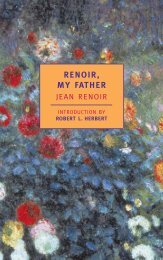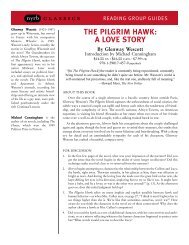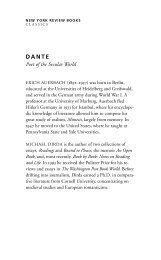SKYLARK - The New York Review of Books
SKYLARK - The New York Review of Books
SKYLARK - The New York Review of Books
Create successful ePaper yourself
Turn your PDF publications into a flip-book with our unique Google optimized e-Paper software.
BIOGRAPHY<br />
nyrb<br />
Dezső Kosztolányi (1885-1936)<br />
was born in Subotica, located in present-day<br />
Serbia. He worked throughout<br />
his life as a journalist and wrote poetry<br />
and fiction. He also translated titles<br />
including A Winter’s Tale and Alice in<br />
Wonderland. Kosztolányi’s first novel,<br />
Nero, the Bloody Poet, won him the<br />
admiration <strong>of</strong> Thomas Mann.<br />
Péter Esterházy is one <strong>of</strong> the<br />
most widely known contemporary<br />
Hungarian writers. His award-winning<br />
works have been published in more<br />
than twenty languages.<br />
Richard Aczel teaches English literature<br />
at the University <strong>of</strong> Cologne,<br />
Germany. He is a playwright and<br />
founding director <strong>of</strong> the theater company<br />
Port in Air. His translations from the<br />
Hungarian include Ádám Bodor's <strong>The</strong><br />
Euphrates at Babylon and Péter<br />
Esterházy's <strong>The</strong> Glance <strong>of</strong> Countess<br />
Hahn-Hahn: Down the Danube.<br />
classics READING GROUP GUIDES<br />
<strong>SKYLARK</strong><br />
by Dezső Kosztolányi<br />
Translated from the Hungarian by Richard Aczel<br />
Introduction by Péter Esterházy<br />
$14.95 US / $17.95 CAN / £8.99 UK / 978-1-59017-339-8<br />
“This short, perfect novel seems to encapsulate all the world’s pain in a soap<br />
bubble. Its surface is as smooth as a fable, its setting and characters are<br />
unremarkable, its tone is blithe, and its effect is shattering.”<br />
—Deborah Eisenberg, <strong>The</strong> <strong>New</strong> <strong>York</strong> <strong>Review</strong> <strong>of</strong> <strong>Books</strong><br />
“Dezső Kosztolányi belonged to a remarkable generation <strong>of</strong> Central European writers. This novel<br />
is a masterpiece. From the opening sentences, he is drawing on nuance and subtle detail; comedy<br />
and pathos. Every gesture speaks volumes...for all the humour and the easy comedy this lively study<br />
<strong>of</strong> small life is as pr<strong>of</strong>ound as a prayer, as subtle as a lament." —<strong>The</strong> Irish Times<br />
ABOUT THIS BOOK<br />
At first glance, the story <strong>of</strong> Skylark is a simple one. It is the turn <strong>of</strong> the twentieth century in the small<br />
Hungarian town <strong>of</strong> Sárszeg, and Mother and Father Vajkay’s daughter Skylark—homely, thirty-five, never<br />
married—is going on a trip to visit her uncle, Béla Bozsó. She’ll only be gone a week, but Mother and<br />
Father have never been away from her for that long; how will they pass the time?<br />
At first, Mother and Father are at a loss for what to do without Skylark, and a week seems unbearably<br />
long. But gradually, the two begin to rediscover all the things they haven’t experienced in years: eating in<br />
restaurants (which Skylark hates), going to the theater, spending money on themselves, indulging in the<br />
fun <strong>of</strong> playing cards and the piano. As the week goes on, Mother and Father find themselves living the<br />
kind <strong>of</strong> life they had all but forgotten—and enjoying it.<br />
But what can that mean about their life with Skylark? After one very long night out, a drunk Ákos<br />
Vajkay <strong>of</strong>fers an answer—an answer that surprises both his wife and himself. Father’s blunt revelation<br />
forces them both to reexamine the life they have built; and when Skylark returns, the themes that have<br />
been building throughout the novel reach their devastating conclusion. Though its plot may be simple,<br />
Skylark is anything but—it is a complex, piercing novel that subtly peels away the layers <strong>of</strong> even the most<br />
seemingly ordinary small-town existences.<br />
FOR DISCUSSION<br />
1. Dezső Kosztolányi began work on Skylark in 1923, but chose to set the novel in 1899—nearly a<br />
quarter-century earlier. What role does Hungarian history play in the narrative? Would it be a different<br />
novel if Kosztolányi had set it in the present? Did you get a sense, when reading Skylark, <strong>of</strong><br />
what is described with reference to Miklós Ijas as “deeply rooted fin-de-siècle melancholy” [p. 206]?<br />
2. Kosztolányi writes, “Géza Cifra was the one person in all the world they could never forgive and<br />
would never cease to resent. What sin, what crime had he committed? None, to be sure” [p. 20].<br />
Why, then, do Mother and Father dislike him so much? What, in their eyes, should Cifra have done<br />
differently? When Father says <strong>of</strong> Cifra, “He hasn’t long to live” [p. 177], do you get the sense that<br />
this prediction is true? Would Mother and Father be able to forgive him if he died?<br />
3. After their first meal there [p.p. 43-45], why are Mother and Father initially reluctant to admit that<br />
they’ve enjoyed eating at the King <strong>of</strong> Hungary?<br />
4. What is your impression <strong>of</strong> the Panthers’ Table? Did its members seem to you like real people?<br />
Kosztolányi writes that Ákos was once a member, but “had suddenly grown old, ‘soured,’ as the others<br />
complained, and no longer paid them any attention” [p. 49]. Why did he quit the club?
nyrb<br />
OTHER NYRB CLASSICS OF<br />
INTEREST<br />
<strong>The</strong> True Deceiver,<br />
Tove Jansson (Translated from the<br />
Swedish by Thomas Teal, Introduction<br />
by Ali Smith)<br />
Niki: <strong>The</strong> Story <strong>of</strong> a Dog,<br />
Tibor Déry (Translated from the<br />
Hungarian by Edward Hyams,<br />
Introduction by George Szirtes)<br />
Contempt,<br />
Alberto Moravia (Translated from the<br />
Italian by Angus Davidson,<br />
Introduction by Tim Parks)<br />
Mouchette,<br />
Georges Bernanos (Translated from<br />
the French by J. C. Whitehouse,<br />
Introduction by Fanny Howe)<br />
Wish Her Safe at Home,<br />
Stephen Benatar (Introduction by John<br />
Carey)<br />
Corrigan,<br />
Caroline Blackwood (Afterword by<br />
Andrew Solomon)<br />
SUGGESTIONS FOR<br />
FURTHER READING<br />
Charlotte Brontë,<br />
Villette<br />
Arthur Koestler,<br />
Darkness at Noon<br />
Emily Dickinson,<br />
Final Harvest<br />
Edgar W. Howe,<br />
<strong>The</strong> Story <strong>of</strong> a Country Town<br />
Dezso Kosztolányi,<br />
Anna Édes<br />
Elizabeth Gaskell,<br />
Wives and Daughters<br />
classics READING GROUP GUIDES<br />
5. We know that Father’s name is Ákos, but the author never refers to Mother by name; rather, he just<br />
calls her “the woman.” Why do you think this is?<br />
6. <strong>The</strong> first night that Skylark was gone, Mother and Father “looked at each other as if something had<br />
suddenly occurred to them. But they didn’t say a word.” Exactly what has occurred? What does the<br />
author mean when he writes, “they came alive in this flood <strong>of</strong> common human hopes and fears”<br />
[p. 58]?<br />
7. Skylark’s long letter, which divides the novel in half, has quite an effect on her father: “its every word<br />
cut him to the quick” [p. 124]. What can the reader learn about Skylark from the contents <strong>of</strong> her letter?<br />
Does its tone seem sincere? What is the significance <strong>of</strong> Father’s losing the letter?<br />
8. Why is it important that Ákos leaves the Panther Club without saying goodbye? Why do the<br />
Panthers view this as a betrayal? Do you think he will ever return? Why or why not?<br />
9. Did Father’s drunken outburst about Skylark surprise you? Do you think he really believes the things<br />
he says? Mother tries to reason with Father, insisting that he is wrong, but the narrator tells us that<br />
she secretly “couldn’t help wondering if her husband’s outrageous suggestion might be true” [p. 166].<br />
What do you think Mother’s true feelings about Skylark are? Does the fight reveal as much about<br />
their feelings about each other as it does their feelings about Skylark?<br />
10. After her fight with Father, Mother finds comfort in a crucifix hanging on their wall and tells Father<br />
they must appeal to God to resolve their feelings about Skylark. What was your sense <strong>of</strong> the tone <strong>of</strong><br />
this section—is Kosztolányi sincere and respectful <strong>of</strong> religion, or ironic and critical <strong>of</strong> it? Do you<br />
think anyone in the novel is meant to represent a Christ figure?<br />
11. When Skylark’s train is late, both Mother and Father automatically assume something bad has happened.<br />
Why is this? Does their behavior while waiting for the train suggest something different<br />
about their attitudes about Skylark than their fight did?<br />
12. Why do you think the author chose to include headings at the beginning <strong>of</strong> each chapter? What do<br />
they add to the novel? How did it orient your reading experience to know what was coming in each<br />
chapter—particularly Chapter 12, when the tension has been building as to whether Skylark’s train<br />
will ever arrive, and the heading reveals the answer before the text does?<br />
13. Though the novel is called Skylark, she is absent throughout the large majority <strong>of</strong> the text. <strong>The</strong> narrative<br />
ends, however, with the author relating Skylark’s most intimate thoughts. Has the novel really<br />
been about Skylark—or about her parents?<br />
14. Where do you think the characters will go from here? Will the Vajkays reflect on what they have<br />
learned during the past week and change their lives, or will they settle back into their old routine?<br />
Will they be happier or less happy?<br />
NYRB Classics is an innovative list <strong>of</strong> outstanding books from many eras and all around the<br />
world. It includes both acknowledged masterpieces and hidden gems <strong>of</strong> literature with<br />
introductions by distinguished contemporary authors. NYRB Classics <strong>of</strong>fers a wide-ranging<br />
and endlessly surprising selection <strong>of</strong> books including novels, short fiction, mystery, suspense,<br />
history, autobiography and memoir, and poetry. Visit www.nyrb.com to learn more about NYRB<br />
Classics and to discover, or rediscover, a host <strong>of</strong> wonderful books.






